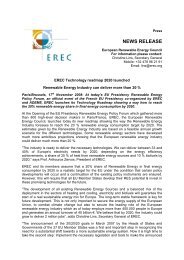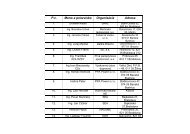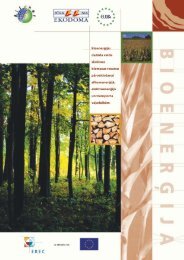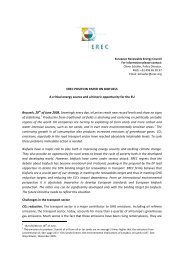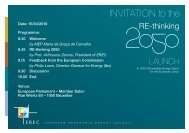English version - European Renewable Energy Council
English version - European Renewable Energy Council
English version - European Renewable Energy Council
You also want an ePaper? Increase the reach of your titles
YUMPU automatically turns print PDFs into web optimized ePapers that Google loves.
C O N F E R E N C E P R O G R A M M Eaimed particularly at reducing the emissions of CO2.More recently, in Johannesburg, the focus of attentionhas moved to address in more detail the mix of instrumentswhich are needed to tackle climate change. Asa result, it is now widely acknowledged that renewableenergies have a crucial and worldwide role to play insustainable development and in poverty alleviation.Kyoto protocolCOMMITMENT TO REDUCEGREENHOUSE GAS EMISSIONSSome years after the Kyoto Protocol wassigned by the EU and many other parties, thefirst objective of a rapid entry into force has notbeen reached. Concerning its main objective,in the year 2003, CO2 emissions in the EU arestill roughly the same as they were in 1990. Tocurb the trend of ever increasing greenhousegas emissions, action is therefore necessary inthe policy area.In Europe, a reinforcement of policies and ofmeasures is needed at national and local levelsin order to create a downward trend inemissions, and to deliver the commitmentmade at Kyoto to an overall 8% reduction ofgreenhouse gas emissions compared to 1990levels by the year 2012.In Johannesburg, the EU committed itself to taking animportant lead both through the EU <strong>Energy</strong> Initiativefor Poverty Reduction and Sustainable Development(EUEI) and through the Johannesburg <strong>Renewable</strong><strong>Energy</strong> Coalition (JREC), to which more than 82 countrieshave now signed up. These commitments havetwo important components, firstly to work to developnew renewable energy policies and more cost competitiverenewable energy technologies for use insidethe EU, and secondly to develop and transfer to developingcountries those mature renewable energy technologies,which are cost competitive and suited foruse in the developing world.It follows that renewable energies will be used in particularin developing countries only where they offer themost cost effective option, or where suitable forms ofinternational support are available to cover any additionalcosts involved. However, even in cases whererenewable energy sources offer the most economicoption, it is often still the case that the available financingmechanisms are not adapted to decentralised energysystems, such as those needed for the majority ofrenewable energy sources.More concrete actions and long term financial commitmentstargeted on the deployment of renewable energiesin developing countries are therefore needed,since it is now crucial that both the EUEI and the JRECshould move forward on a firmer financial basis. Interms of international support, the Clean DevelopmentMechanism (CDM), foreseen in the Kyoto protocol, mayhave a growing role to play in the future for fosteringthe deployment of renewable energy sources in developingcountries, but the extent to which this will stimulatenew renewable energy projects and investmentsis not yet clear.Since this conference aims to give the <strong>European</strong> inputto the Bonn Conference in June 2004, this sessionshould focus on the policies and measures whichshould be adopted in Europe, in order to increase theshare of RES and to make available to the developingcountries a portfolio of mature, cost competitiverenewable energy technologies. In addition, it shouldaddress the related issues of helping the developingcountries to establish their own renewable energypolicies, sustainable financing, and the provision oftechnical assistance for capacity building, technologytransfer and training.What role could Europe play at internationallevel to increase the share of RES ?What should Europe do to support the developmentof <strong>Renewable</strong> <strong>Energy</strong> Sources for use inthe developing world?How will renewable energy contribute topoverty eradication and sustainable developmentin developing countries?What additional policy measures are necessaryto finance the EU initiatives launched inJohannesburg?What possibilities are offered by the CleanDevelopment Mechanism (CDM) and JointImplementation (JI) to renewable energysources deployment?F R O M R I O K Y O T O A N D J O H A N N E S B U R G - P A N E L 3 b21


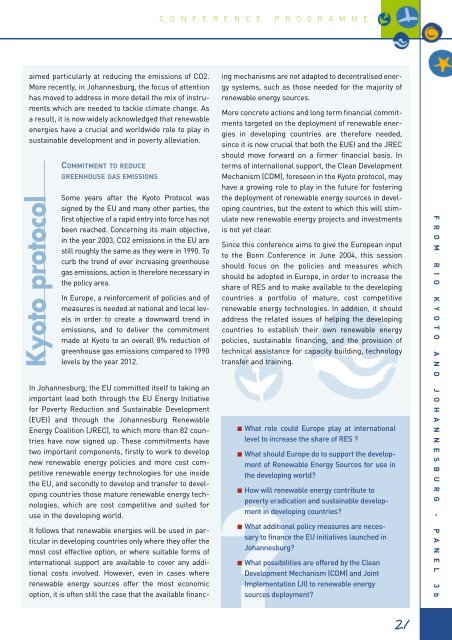
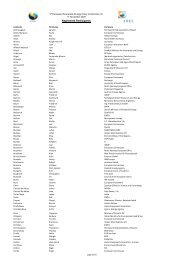
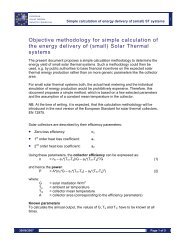

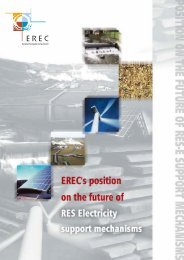
![Energy [R]evolution - Greenpeace](https://img.yumpu.com/47174859/1/184x260/energy-revolution-greenpeace.jpg?quality=85)
